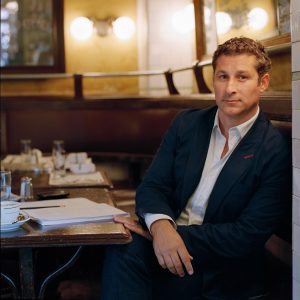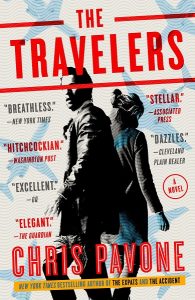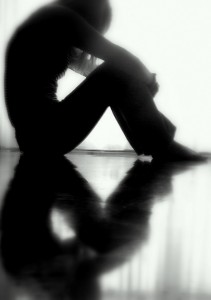‘The Travelers,’ A Conversation with Chris Pavone
Chris Pavone, formerly a book editor, is the author of two previous New York Times bestsellers, The Accident and The Expat s, and winner of the Edgar and Anthony Awards. His latest novel is The Travelers.
s, and winner of the Edgar and Anthony Awards. His latest novel is The Travelers.
The Travelers features Will Rhodes, his wife Chloe, and Malcomb, his boss at the magazine Travelers at which Will is an international correspondent writing about food, wine, foreign cultures, celebrities and expats. But Will has no idea of the secret agendas of some people, including those of his wife and Malcomb. When Will travels to Capri, Bordeaux, Paris, London and Argentina, he finds himself at the center of a dangerous web, one imperiling his marriage, career, and his life.
The Travelers takes readers from the beaches of France, to Barcelona, New York, Argentina and to Iceland, all places hiding a dark story of surveillance, lies and espionage. How did you acquire so much knowledge about clandestine espionage operations?
[Laughter] I don’t think I’ve acquired much knowledge about espionage.
I imagined this novel as a story about people who don’t really know for whom they work. We all live in a universe in which we’re either asked to or are forced to accept certain premises about our employment without having the opportunity to verify them. There are some types of employment where it’s perfectly clear for whom you’re working: for instance, teaching in a public school, your boss is the principal, who works for the Board of Education which is publicly funded, it’s very clear.
It’s less clear in the private sector. We go to work every day and often don’t know who owns the company or what their real agenda may be. We don’t truly know what kind of contribution we’re making to some hidden end-game. It took me a decade of working for a large company before I had the curiosity to find out who actually owned that company.
That experience became the premise of this novel. Espionage is somewhat incidental to the story I wanted to tell.
In most espionage novels, the characters risk their lives trying to save somebody, or while protecting a nation from some threat. In The Travelers, that’s not what’s going on. I used espionage as a device to heighten the characters’ personal dramas.
Self-interest thrusts the characters into conflict with one another. Deceit in both personal and business relationships results in their lives spinning out of control.
Speaking of conflicts, I loved your depictions of the inner workings of various characters’ minds, especially Will’s and his boss, Malcomb’s. Will you talk about that?
I try to construct each of my novels around one central theme—core tensions shared by the characters. In The Travelers, everyone is defined by his or her relationship to work. I put each character on a different rung of the ladder: from the lowliest assistant to a powerful man in the world of media.
Will occupies a middle rung; while Malcom, as the editor, is perched at the top.
Their seemingly comfortable and enviable lives have been intertwined for many years, and they consider each other friends; but certain tensions are added to the mix when Will finds himself working for Malcom. That tension is central to the drama in this book.
One man is lying to the other about something critically important to the other.
We’re not worried someone’s going to get killed, but rather, we’re worried someone will be found out.
Much of The Travelers orbits around marital secrets, as did your novel, The Expats. Will you talk about secrets and lies in a marriage?
I think secrets are a compelling issue for a novel to explore. Most people are married and I don’t think Im going too far out on a limb by saying no one is completely truthful about everything. What if a particular lie your spouse is telling you has enormous consequences ?
What if he or she isn’t who they claim to be ? What if what they actually do for a living is not what you’ve been led to believe they do? What if you’re waking up each morning next to someone who at least in part, is a stranger?
Although I don’t have those concerns about my wife [Laughter]; at times, I do have those irrational thoughts about people in general. And, I don’t think I’m alone in that regard. So, I like that kind of tension in a novel. It allows the reader to root for both sides: on one hand, you want the person to be found out, but you also want the secrets to remain intact.
I was impressed by your rich descriptions of even the most quotidian things: an airport, a party, a yacht, a room, or a building’s basement or lobby. How would you describe your writing style?
I think my writing style is sensual. I attempt to engage all the reader’s sense memories when I’m writing descriptive passages. I use descriptions to set a mood and drive the reader to expect or worry about something. It helps to engage every sense—not just seeing things, but tasting, smelling, and hearing things. I try getting as much of that onto the page as is reasonable. I try to engage readers so it feels like they’re actually there, in the scene.
Who are the writers who have influenced your own writing?
That’s such a hard question to answer. The truth is that I’m influenced in some way by practically everything I read, and I read an enormous amount of fiction. I’m constantly taking notes on things that occur to me while I’m reading someone else’s book. The jottings have nothing to do with the book I’m reading, but something I’m reading triggers my own imagination in a completely different direction. There’s very little that makes me want to write more and better than my being immersed in a very good book.
What do you love about the writing life?
I absolutely love writing. As a kind of labor that people will pay you to do, I can’t imagine anything better. I love making things up and my favorite part of writing is when creating the first draft of a novel. I love making decisions and finding new plot twists. I love the invention. The one thing I don’t like is that too frequently, I get ideas in the middle of the night. I have to write them down or I won’t remember them. Then, I can’t get back to sleep because my imagination is all fired-up.
What’s coming next from Chris Pavone?
I’m writing a sequel to my first book, The Expats. This one is called The Paris Diversion and features some of the characters from the first novel.
Congratulations on writing The Travelers, a propulsive, richly imagined, insightful, literary thriller that had me guessing all the way to the last pages.
Mark Rubinstein’s latest book is Bedlam’s Door: True Tales of Madness and Hope, a medical/psychiatric memoir.






 As David Mamet
As David Mamet